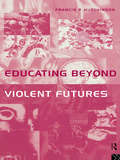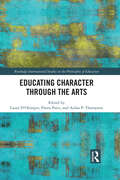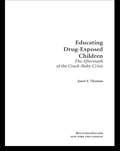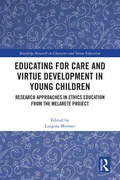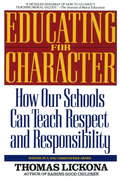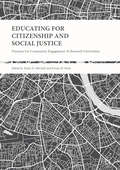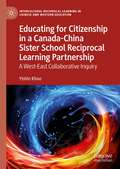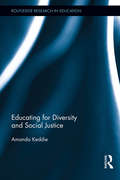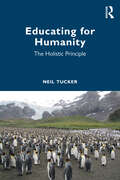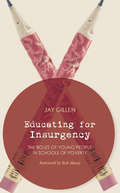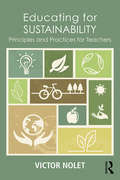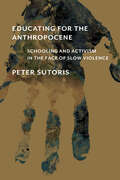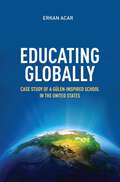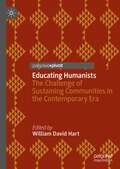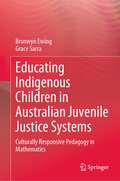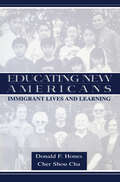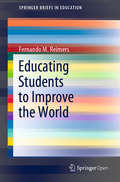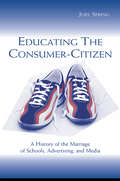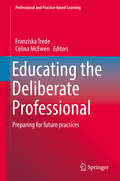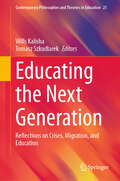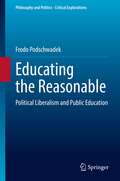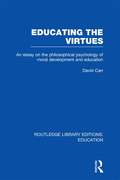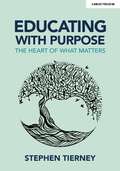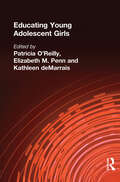- Table View
- List View
Educating Beyond Violent Futures
by Francis HutchinsonAs we enter the Twenty-First Century, it is easy to assume that worsening trends in violence will be a feature of our lives, whether in our schools, our societies or as a species. Educating Beyond Violent Futures challenges assumptions that trends in violence are destiny, and raises crucial questions about choice and engagement. Drawing upon new research, this book is essential reading for those who want to prepare our children for living constructively in the next century
Educating Character Through the Arts (Routledge International Studies in the Philosophy of Education)
by Laura D’Olimpio Panos Paris Aidan P. ThompsonThis volume investigates the role of the arts in character education. Bringing together insights from esteemed philosophers and educationalists, it looks to the arts for insight into human character and explores the arts’ relationship to human flourishing and the development of the virtues. Focusing on the moral value of art and considering questions of whether there can be educational value in imaginative and non-narrative art, the nine chapters herein critically examine whether poetry, music, literature, films, television series, videogames, and even gardening may improve our understanding of human character, sharpen our moral judgement, inculcate or refine certain skills required for virtue, or perhaps cultivate certain virtues (or vices) themselves. Bringing together research on aesthetics, ethics, moral and character education, this book will appeal to students, researchers and academics of philosophy, arts, and education as well as philosophers of education, morality, aesthetics, and teachers of the arts.
Educating Drug-Exposed Children: The Aftermath of the Crack-Baby Crisis
by Janet Y. ThomasThis is the first book to use teachers' experiences to understand how prenatal drug exposure affects children's' development , and how social construction of the problem influences perceptions within schools.
Educating for Care and Virtue Development in Young Children: Research Approaches in Ethics Education from the MelArete Project (Routledge Research in Character and Virtue Education)
by Luigina MortariThis book champions care education in early childhood school contexts, addressing the critical need for an effective and meaningful ethics education grounded in Platonic and Aristotelian reflections on virtues, and ultimately positing a theory of ethics education that connects ancient philosophy to contemporary care thinking.This theory is supported by the empirical findings of the MelArete Project, a 10-year research project in care and virtues education that guides children’s attention to the concepts of care and virtues. Unique amongst contemporary virtue and character approaches, Mortari and her colleagues have developed a rich research base that combines recent educational theories with ancient and continental philosophy.Ultimately arguing for an ethics education centered on care in the wake of our current ethical crisis, the book contributes to a growing body of literature on prominent virtue and character education programs around the world and will therefore appeal to scholars, researchers, and postgraduate students working in moral and values education, ethics education, and educational theory more broadly. Care ethicists and early childhood educators will also benefit from this volume.
Educating for Character: How Our Schools Can Teach Respect and Responsibility
by Thomas LickonaCalls for renewed moral education in America's schools, offering dozens of programs schools can adopt to teach students respect, responsibility, hard work, and other values that should not be left to parents to teach.
Educating for Citizenship and Social Justice
by Tania D. Mitchell Krista M. SoriaIn this edited volume, authors explore the ways in which departments, programs, and centers at public research universities are working to better engage students in the work of citizenship and social justice. The chapters in this book illuminate the possibilities and challenges for developing community engagement experiences and provide evidence of the effects of these efforts on communities and undergraduate students' development of citizenship outcomes. This text reveals how important the integration of our intentions and actions are to create a community engaged practice aimed towards justice.
Educating for Citizenship in a Canada-China Sister School Reciprocal Learning Partnership: A West-East Collaborative Inquiry (Intercultural Reciprocal Learning in Chinese and Western Education)
by Yishin KhooThis book enriches the discourse around Global Citizenship Education in teacher education through the example of a teacher's experience in a Canada-China Sister School reciprocal learning landscape. Instead of positioning global citizenship teaching and learning as a set of fixed goals to be attained by teachers alone, this book approaches global citizenship teaching and learning as unfinished lifework in progress and as situated curriculum problems to be inquired together by university researchers, school teachers, and students under the spirit of reciprocity and community. This reimagination of narratives, theory, and action start from collaborative and reciprocal learning partnerships among Chinese and Canadian researchers and teachers in the practicality of re-searching and re-enacting the purpose and meanings of twenty-first century education in a Canada-China Sister School setting.
Educating for Diversity and Social Justice (Routledge Research in Education)
by Amanda KeddieEducating for Diversity and Social Justice foregrounds the personal stories of educators who are engaging the space of schooling as a site of possibility for realizing the goals of social justice. It is a book inspired by a vision of education as a practice of freedom where young people – especially those who are marginalized – can learn that they have a voice and the power to change their world for the better. Drawing on the work of US philosopher Nancy Fraser, the book examines issues of justice and schooling in relation to three dimensions: political, cultural and economic. While its focus is on research within three Australian case study schools, the book provides an international perspective of these dimensions of justice in western education contexts as they impact on the schooling performance of marginalized students. Towards greater equity for these students, the book presents a comprehensive scaffold for thinking about and addressing issues of schooling, diversity and social justice. Through practical examples from the case study research, the book illustrates the complexities and possibilities associated with schools providing inclusive environments where marginalized voices are heard (political justice), where marginalized culture is recognized and valued (cultural justice) and where marginalized students are supported to achieve academically towards accessing the material benefits of society (economic justice).
Educating for Humanity: The Holistic Principle
by Neil TuckerThis book explores the international landscape of educational scholarship, policy, and practice. Tucker argues there is a fundamental aim for world education. It is to educate complete human beings in all their dimensions, such that they become the best persons they can be, and participate fully in ‘the human story’.Tucker asks: What is the world of education for? What is it that early childhood centers, schools and local communities are meant to do for children and their learning? Representing a decade of research, the text examines the most common concepts of the purposes of education, human nature and learning offered by scholars, international authorities and pedagogies, nations, education organizations, neuroscience, early childhood educators, and individual schools. To ‘educate for humanity’, Tucker provides a complete concept of holistic education – of whole child and holistic learning for a whole world.The book is an essential resource for those involved in the world of education – teachers, university administrators, school authorities, policy makers, and educational organizations. Parents and community members with a strong interest in the education of all children will also find much that is informative and challenging to think about.
Educating for Insurgency
by Bob Moses Jay GillenA manifesto for today's broken schools.Desegregation has failed. Schools filled with black and brown students have become plantations of social control, where the policing of behavior trumps the expanding of minds. Radical teachers and organizers in American public schools must help young people fashion an insurgency. That means, at the very least, seeing each student's rebellion not as violation, but as communication.Jay Gillen writes with passion and compassion about the daily lives of poor students trapped in institutions that dismiss and degrade them. In the spirit of Paulo Freire, and using the historical models of slave rebellions and Civil Rights struggles as guides, Gillen explains what sort of insurgency is needed and how to create it: the tools and techniques required to build social, intellectual, and political power.This poetic manifesto of revolutionary "educational reform" belongs in the pocket of anyone who currently works in, suffers through, or simply cares about public schooling in this country.Jay Gillen teaches English in a Baltimore public school and has worked with the Baltimore Algebra Project since 1995, building math literacy among youth of color and youth experiencing poverty in US public schools.Bob Moses is an educator and Civil Rights activist. He founded the Algebra Project in 1982.
Educating for Sustainability: Principles and Practices for Teachers
by Victor NoletEducating for Sustainability presents fundamental principles, theoretical foundations, and practical suggestions for integrating education for sustainability into existing schoolwide systems and programs, organized in three sections: Principles of Education for Sustainability; Fostering a Sustainability Worldview; Learning and Thinking for Sustainability. Designed for teachers and teachers-to-be at all grade levels and across the content areas, the focus is on professional practices and pedagogical approaches rather than specific topics often associated with sustainability. Each chapter includes a number of supports to help readers monitor and improve their own professional practice and to deepen their own sustainability wordview, including textboxes in most chapters that provide more detailed or specialized information and a range of application exercises. All chapters include several "Consider This" activities and an "Extend Your Professional Knowledge" feature. Directly grounded in K-12 classroom practice, this book presents useful and realistic information for teachers looking to reorient their work toward sustainability and help their students develop new thinking and problem-solving abilities.
Educating for the Anthropocene: Schooling and Activism in the Face of Slow Violence
by Peter SutorisThe work of environmental educators and activists in India and South Africa offers new models for schooling and environmental activism.Education has never played as critical a role in determining humanity&’s future as it does in the Anthropocene, an era marked by humankind&’s unprecedented control over the natural environment. Drawing on a multisited ethnographic project among schools and activist groups in India and South Africa, Peter Sutoris explores education practices in the context of impoverished, marginal communities where environmental crises intersect with colonial and racist histories and unsustainable practices. He exposes the depoliticizing effects of schooling and examines cross-generational knowledge transfer within and beyond formal education. Finally, he calls for the bridging of schooling and environmental activism, to find answers to the global environmental crisis.The onset of the Anthropocene challenges the very definition of education and its fundamental goals, says Sutoris. Researchers must look outside conventional models and practices of education for inspiration if education is to live up to its responsibilities at this critical time. For decades, environmental activist movements in some countries have wrestled with questions of responsibility and action in the face of environmental destruction; they inhabited the mental world of the Anthropocene before much of the rest of the world. Sutoris highlights an innovative research methodology of participatory observational filmmaking, describing how films made by children in the Indian and South African communities provide a window into the ways that young people make sense of the future of the Anthropocene. It is through their capacity to imagine the world differently, Sutoris argues, that education can reinvent itself.
Educating Globally: Case Study of a Gulen-Inspired School in the United States
by Erkan AcarThe purpose of this case study is to describe the characteristics of a Gulen-inspired School (GIS) in the United States. The study identifies the dynamics of a US based GIS in terms of the school's curriculum, history, educational success, hiring practices, admission processes and networking. In order to understand its unique meaning and significance, interviews and observations were conducted in one GIS located in the northeast region of the United States. Gulen inspired schools are those founded around the world by the volunteers of the Gulen (or Hizmet) Movement. Gulen-inspired schools provide all levels of education (K-12 and college levels) in different educational systems. These schools are inspired by the educational philosophy of Fethullah Gulen, a Turkish-Muslim scholar living in the United States, and numbered around 1,000 in more than 150 countries throughout the world.
Educating Humanists: The Challenge of Sustaining Communities in the Contemporary Era (Studies in Humanism and Atheism)
by William David HartThis volume explores the challenges that humanists face from hostile religious traditionalists on its right flank and from the political antihumanism, which is often postsecular, of critics on its left flank. Given this dual challenge, how can "secular" humanism educate, sustain, and reproduce itself?
Educating Indigenous Children in Australian Juvenile Justice Systems: Culturally Responsive Pedagogy in Mathematics
by Bronwyn Ewing Grace SarraThis book addresses key issues in the context of the national policy of educating children accused of crimes in Juvenile Courts in Australia. For several decades, National and State Governments in Australia have struggled to define education, constantly seeking to improve the way society applies the concept. This book presents an accurate portrayal of consequences of the education policy of trying to educate troubled children and young people in trouble with the law. It describes the work of juvenile detention centre mathematics teachers and their teaching contexts. It portrays teachers as learners, who ventured with researchers with a theoretical perspective. This book focuses on culturally responsive pedagogies that seek to understand the ways Indigenous children and young people in juvenile detention make sense of their mathematical learning, which, until the time of detention, has been plagued by failure. It examines how the underperformance of Aboriginal and Torres Strait Islander students, and students from low socioeconomic backgrounds are strong determinants of their overrepresentation in the juvenile justice system in Australia. This book presents the argument that if the students’ literacy and numeracy levels can be improved, there is opportunity to build better futures away from involvement in the juvenile justice system and towards productive employment to improve life chances.
Educating New Americans: Immigrant Lives and Learning (Sociocultural, Political, and Historical Studies in Education)
by Donald F. Hones Shou C. Cha Cher Shou ChaEducating New Americans examines what it means to be an American through the history of a refugee from Laos. Shou Cha is a community liaison for an elementary school, an evangelical preacher, a community leader, a husband, and a father. His lifetime of learning, presented mainly in his own voice, is framed by various historical and sociological contexts that have shaped his life, the lives of other Hmong refugees, and the lives of other Americans, old and new. These contexts include the history of immigrant education policies in the United States, as seen through the lives of immigrant children; the historical and sociological impact of warfare as well as missionary work in the lives of the Hmong people; and the sociology of generational conflict, especially as it is felt among immigrant groups. Finally, this book suggests that immigrant parents such as Shou Cha can contribute to the process of teaching peace to children, and making peace between diverse groups in America, the land of e pluribus unum.
Educating Students to Improve the World (SpringerBriefs in Education)
by Fernando M. ReimersThis open access book addresses how to help students find purpose in a rapidly changing world. In a probing and visionary analysis of the field of global education Fernando Reimers explains how to lead the transformation of schools and school systems in order to more effectively prepare students to address today’s’ most urgent challenges and to invent a better future. Offering a comprehensive and multidimensional framework for designing and implementing a global education program that combines cultural, psychological, professional, institutional and political perspectives the book integrates an extensive body of empirical literature on the practice of global education. It discusses several global citizenship curricula that have been adopted by schools and school networks, and ties them into an approach to lead school change into the uncharted territory of the future. Given its scope, the book will help teachers, school and district leaders tackle the change management needed in order to introduce global education, and more generally increase the relevancy of education. In addition, the book offers a “bridge” for more productive collaboration and communication between those who lead the process of educational change, and those who study and theorize this important work.At a time when the urgency of our shared global challenges calls for more understanding and collaboration and when the rapid transformation of societies requires that we help students develop a clear sense of relevancy and purpose, this book offers a way to pursue deep and sustainable change in instruction and school culture, so that students learn that nothing human is foreign and that they can find meaning in lives aligned with audacious purposes to make the world better.
Educating the Consumer-Citizen: A History of the Marriage of Schools, Advertising, and Media (Sociocultural, Political, and Historical Studies in Education)
by Joel SpringIn Educating the Consumer-Citizen: A History of the Marriage of Schools, Advertising, and Media, Joel Spring charts the rise of consumerism as the dominant American ideology of the 21st century. He documents and analyzes how, from the early 19th century through the present, the combined endeavors of schools, advertising, and media have led to the creation of a consumerist ideology and ensured its central place in American life and global culture. Spring first defines consumerist ideology and consumer-citizen and explores their 19th-century origins in schools, children's literature, the commercialization of American cities, advertising, newspapers, and the development of department stores. He then traces the rise of consumerist ideology in the 20th century by looking closely at: the impact of the home economics profession on the education of women as consumers and the development of an American cuisine based on packaged and processed foods; the influence of advertising images of sports heroes, cowboys, and the clean-shaven businessman in shaping male identity; the outcomes of the growth of the high school as a mass institution on the development of teenage consumer markets; the consequences of commercial radio and television joining with the schools to educate a consumer-oriented population so that, by the 1950s, consumerist images were tied to the Cold War and presented as the "American way of life" in both media and schools; the effects of the civil rights movement on integrating previously excluded groups into the consumer society; the changes the women's movement demanded in textbooks, school curricula, media, and advertising that led to a new image of women in the consumer market; and the ascent of fast food education. Spring carries the story into the 21st century by examining the evolving marriage of schools, advertising, and media and its ongoing role in educating the consumer-citizen and creating an integrated consumer market. This book will be of wide interest to scholars, professionals, and students across foundations of education, history and sociology of education, educational policy, mass communications, American history, and cultural studies. It is highly appropriate as a text for courses in these areas.
Educating the Deliberate Professional
by Franziska Trede Celina McewenThis book takes a fresh look at professional practice and professional education. In times of increased managerialism of academic teaching and a focus on graduate learning outcomes, it discusses possibilities to teach and learn otherwise. A deliberate professional is someone who consciously, thoughtfully and courageously makes choices about how to act and be in the practice world. A pedagogy of deliberateness is introduced that focuses on developing the following four characteristics of professionals: (1) deliberating on the complexity of practice and workplace cultures and environments; (2) understanding what is probable, possible and impossible in relation to existing and changing practices; (3) taking a deliberate stance in positioning oneself in practice as well as in making technical decisions; and (4) being aware of and responsible for the consequences of actions taken or actions not taken in relation to the 'doing', 'saying', 'knowing' and 'relating' in practice. Educating the deliberate professional is a comprehensive volume that carves out and explores a framework for a pedagogy of deliberateness that goes beyond educating reflective and deliberative practitioners. As a whole, this book argues for the importance of educating deliberate professionals, because, in the current higher education climate, there is a need to reconcile critique (thinking), participation (doing) and moral responsibility (relating to others) in professional practice and professional education.
Educating the Next Generation: Reflections on Crises, Migration, and Education (Contemporary Philosophies and Theories in Education #21)
by Wills Kalisha Tomasz SzkudlarekThis book offers perspectives on how "education as we know it" is being challenged by the complexity of "nextness" that no longer allows for taking deeply grounded assumptions on the meaning of education as granted. This book interrogates ontological, ethical, and political challenges that immigrant children face. With the global situation in which more and more children are displaced, direct intergenerational transmission is broken, suspended, or complicated and made incoherent, and “things of concern” may be radically different for policymakers, for teachers, students, or their parents. Even the concept of the child as one who needs to be educated before they start participating in adult life cannot be taken for granted in this context. What needs and what can be passed on — and what is worth passing in this context? How do we conceptualize education to encounter newcomers in their realities of being both native and strange, inmate and neighbour or alien, temporal and spatial — and how do we address them all as worth of address? These questions will shine through the authors' reflections on crisis, education, and migration in the complex context of war, climatic catastrophe, displacement, hospitality and institutionalised hostility. This book suggests significant ideas for educational theory and practice responsive to the multi-dimensional crisis of which massive migrations is the most pressing feature in school nowadays.
Educating the Reasonable: Political Liberalism and Public Education (Philosophy and Politics - Critical Explorations #17)
by Frodo PodschwadekOffering the first developed account of political liberal education, this book combines a thorough analysis of the theoretical groundwork of political liberal education with application-oriented approaches to contemporary educational challenges. Following in depth engagement with the shortcomings of Rawls’ theory and addressing some key objections to neutrality-based restrictions in education, the volume moves on to provide an insightful discussion of topics such as same-sex relations in sex-education, the position of migrant children and the rights of religious parents to determine the education of their children. This book outlines a political liberal account of education which provides a useful contribution to the current debates about liberalism and education in a way unprecedented in the literature on political liberalism so far. It is of interest to anyone working at the intersection of political philosophy and philosophy of education as well as for scholars with a broader interest in how liberalism can respond to the challenges of value pluralism.
Educating the Virtues: An Essay on the Philosophical Psychology of Moral Development and Education (Routledge Library Editions: Education)
by David CarrTracing the views on moral life of such past philosophers as Plato, Aristotle and Kant, as well as of such theorists as Durkheim, Freud, Piaget and Kohlberg, the author sets forth a full discussion of the nature and educational implications of the idea of moral virtue.
Educating with Purpose: The heart of what matters
by Stephen TierneyIf the last decade focused on what works, the decade ahead must focus on what matters. In his second book, Tierney argues that the purpose of education must move to the heart of the educational debate. Purpose will significantly influence what schools and the education system as a whole will do next. Why we educate is a question from which all other aspects evolve. A question for all times, it will resonate with those who have experienced the Great Pause. Using four main philosophies of education - personal empowerment, cultural transmission, preparation for work and preparation for citizenship - he provides the underpinning theory and seminal works alongside a powerful critique. Using the impact of these different philosophies on a school's curriculum he challenges the current orthodoxy, allowing the reader to consider alternative views and approaches. Proposing that the telos of education must be a life well lived, he argues for a re-purposing of education, with a preferential option for the poor at its heart. Educative and challenging this will be read by all those interested and involved in education.
Educating with Purpose: The heart of what matters
by Stephen TierneyIf the last decade focused on what works, the decade ahead must focus on what matters. In his second book, Tierney argues that the purpose of education must move to the heart of the educational debate. Purpose will significantly influence what schools and the education system as a whole will do next. Why we educate is a question from which all other aspects evolve. A question for all times, it will resonate with those who have experienced the Great Pause. Using four main philosophies of education - personal empowerment, cultural transmission, preparation for work and preparation for citizenship - he provides the underpinning theory and seminal works alongside a powerful critique. Using the impact of these different philosophies on a school's curriculum he challenges the current orthodoxy, allowing the reader to consider alternative views and approaches. Proposing that the telos of education must be a life well lived, he argues for a re-purposing of education, with a preferential option for the poor at its heart. Educative and challenging this will be read by all those interested and involved in education.
Educating Young Adolescent Girls
by Kathleen B. DeMarrais Elizabeth M. Penn Patricia O'ReillyThis text for preservice and in-service teacher education courses shows how schools can educate girls and promote their positive self-esteem at the same time. Its purpose is to help teachers facilitate the development of gender-equitable schools and classrooms. Taking a feminist developmental approach, the text draws on an interdisciplinary knowledge base, synthesizing research from psychology, anthropology, sociology, and education. While it is rooted in scholarly research, the focus is on clarifying the connection between theory and practice, with an emphasis on practical applications. The text is organized in two sections--"Growth and Development" and "Teaching and Learning"--and includes a variety of engaging pedagogical features. Underscoring the need for teachers, school administrators, and parents to become aware of the intersection of development and education, Educating Young Adolescent Girls: *combines gender, growth, and development; *demonstrates how schooling can facilitate the total development of young adolescent girls; and *addresses a multiplicity of issues, including adolescent girls of color and young adolescents girls' sexuality.
